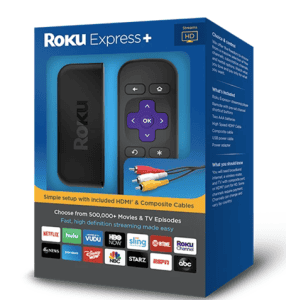Roku is one of the premier streaming companies in the world, with millions of their devices scattered in homes all across America! It wouldn’t be an exaggeration to call Roku a household mainstay, but what’s the bare minimum they need to function? Will Roku work on any TV?
Roku will easily work on any TV that has an HDMI port. Units without HDMI ports require composite-to-HDMI cable converters to get Roku working on their TV. It’s rare to find a TV in use that predates even composite cables, so in practice you can reasonably expect Roku devices to work on any TV.
Just because Roku can work on any TV doesn’t mean it’ll necessarily work well on any TV. Older TVs will be unable to take advantage of 4k resolution and HDR support, and particularly dated units might even be stuck with standard definition quality (480p)!
Roku streaming devices are designed with compatibility and ease of use in mind, but what you need to get them up and running on your TV depends on your system’s specifications. We’ll go over everything you need to know about setting Roku up on your TV below.
Minimum Requirements to Get Roku Working on TV
To get any streaming device working, you’ll need all three of the following:
-
- Power source (to sustain usage)
- Wi-fi (to access content)
- HDMI port (to relay the stream)
While most of these are guaranteed, older TVs may not have HDMI ports – instead, those will have something called composite cables, which aren’t compatible with most Roku devices.
The Exception
Back in the day, Roku actually had support for older televisions using composite cables through a specific device, the Roku Express+ (2018). It was expressly marketed for users with dated TV units, but trying to find one just to let you use your Roku on an old TV isn’t practical.

https://www.roku.com/products/roku-express-plus-2018
For starters, the Roku Express+ (2018) has been discontinued for quite a while. The product is still receiving software updates and other support from Roku, but its age and status make it a poor long-term investment for content streaming.
That’s assuming you’d even find it, as the Roku Express+ hasn’t been stocked by commercial distributors for years. Your best bet at finding one would be through resellers – which always come at a ridiculous markup!
Composite-to-HDMI Converter
While an HDMI port is best for easy use, you actually don’t need one to connect Roku to your TV. You could use a composite-to-HDMI converter to bridge this gap. These converters are simple, cheap, and easy to find in any electronic store.
If you want a more detailed outline of how to proceed, follow the video guide below.
If you weren’t able to follow the above video properly, we’ve got another one to send your way.
It’s important to note that you’ll want to plug the composite cables in first, as this will be the source of your TV’s display.
Are There Any Drawbacks To Using Roku on Certain TVs?
A Roku unit can work on just about any TV, but it’s unlikely that you’ll be able to enjoy all the features the streaming service has to offer.
Roku provides both 4k resolution quality and HDR – the former handles image quality, while the latter is responsible for brightness and color contrast. Most Smart TVs (especially Samsung units) offer high-definition resolution (1080p) or greater, giving you the most value for the service. Older TVs with HDMI support offer lower resolution (720p), which shouldn’t be too bad.
TVs that use composite cables only offer standard resolution (480p), which is more noticeable for viewers – even smartphones offer greater streaming quality than that! The refresh rate also suffers, as composite cables only support half the refresh rate of HDMI cables (60Hz vs 120Hz)
If you’ve got a converter cable tucked away you can expect Roku to work on almost every TV you’d find, making it awesome for traveling! Stream quality will vary, but at least you’ll be able to make reliable use of your Roko subscription no matter where you go!
Final Thoughts
Roku units can work on just about any TV, and the main thing you need to consider is the type of audio-visual cable used.
Almost every smart TV (and a good chunk of modern ones) has at least one HDMI port, easily interfacing with your Roku. Older TVs might be using composite cables, which would be incompatible with your Roku unless you plugged it into a Composite-to-HDMI converter.
You’ll be able to get Roku working with pretty much every TV you find, but older ones will suffer noticeable performance issues due to poorer resolution and lower image refresh rates.

